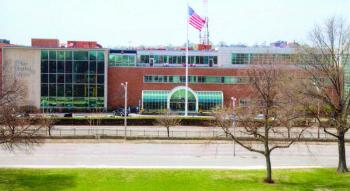December 11, 2014
 Boston Globe's property: Based in Dorchester since 1958.
Boston Globe's property: Based in Dorchester since 1958.
Winstanley Enterprises, the Concord-based company that entered into a purchase-and-sales agreement last month to buy the Boston Globe property on Morrissey Boulevard, is a little-known quantity in the city of Boston. But a Reporter review of Winstanley’s development history reveals a company with a respected track record in suburban communities that has been taking on increasingly larger-scale projects in recent years.
In an email sent to Globe staff members in November, company CEO Mike Sheehan called Winstanley a “family-owned firm experienced in mixed-use development [that] would make a terrific steward of this place we’ve called home since 1958.”
Owned by principals Adam, David, and Carter Winstanley, the developer has primarily invested in Connecticut. As of this week, Winstanley is still in the due diligence period of the purchase process. No one is authorized to speak publicly about the firm’s plans until it closes on the property in mid-to-late February, said Adam Winstanley.
The Globe property development is a departure for the Winstanleys – a large undertaking in a major urban setting. The company currently owns and manages 27 properties in New England covering 2.9 million square feet, according to a corporate summary provided to the Reporter. Since the early 1990s, Winstanley has acquired more than 100 properties throughout New England and has made its mark primarily through commercial real estate transactions, developing properties for industrial use, for space for research and design, offices, biotechnology and lab operations, and retail use.
Columbia Savin-Hill Civic Association President Eileen Boyle said her organization has yet to hear from the company’s representatives. But breaking down one of Winstanley’s projects could give some insight into how the company might work the land.
In Windsor, CT, Winstanley is planning the development of a massive, 653-acre mixed use, residential development titled Great Pond. The multi-phase plan calls for 4,010 residential units in a mix of urban, neighborhood, and clustered developments dotted with parks, ponds, restaurants, and other amenities. It is the company’s first foray into residential development. The small town of just under 30,000 residents, as of 2010, is a 25-minute drive from Springfield, Massachusetts, and a 10-minute drive from Hartford.
“This is a big deal for us. This would be like one of the military bases in the Boston area being redeveloped,” said Windsor Town Planner Eric Barz. The land was previously owned by a number of energy companies and contaminated, but sufficiently cleaned by its former owners –something the Winstanleys will grapple if the company goes forward with the purchase. Printing presses have been a mainstay of the Globe property for some 56 years and chemical-soaked soil has been identified in at least two locations.
The Great Pond development was first proposed in 2011, but in the community meetings prior to that, Barz recalls David Winstanley, in particular, as being cooperative and receptive to the community’s input. Winstanley and the land’s private owner initially proposed a commercial and industrial development, but the community’s insistence on a “neo-traditional village” approach was approved in the end.
Construction crews have not yet broken ground on the project, Barz said, due to continuing talks with the state’s Metropolitan District Commission over the site’s water, energy, and sewage situations. He hopes the issue will be resolved soon so construction can move ahead.
On a smaller scale than the Great Pond, Norwichtown Commons in Norwich, CT, was seen as an important improvement in the town of 41,000 halfway between Providence and New Haven, according to town manager Alan Bergren. Winstanley purchased the “blight on the landscape Norwichtown Mall in 2011 for $15.75 million, then poured in $7.5 million to upgrade the mall, according to The Bulletin in Norwich. “They did a fantastic job. They converted it to a conventional mall and they have just about all the units filled up,” Bergren said.
This spring, Winstanley sold Norwichtown Commons for $39.31 million – a $16 million profit.
It is not yet clear where the Globe will relocate once they execute a sale with Winstanley or another party, although a place on the waterfront is seen as the leading contender. The deal with Winstanley includes a three-year lease back contingency that will allow the Globe time to find a new headquarters. In November, Sheehan told his staff, “We’re looking to move sometime in late 2016/early 2017, so it won’t be long before we have a much clearer picture of our future.”
Editor's note: The headline of this story was changed on Thursday, Dec. 11 to reflect the fact that Winstanley Enterprises has done development projects in urban settings, most notably New Haven, CT. However, the Globe property would be their first venture in Boston.
Villages:
Topics:



